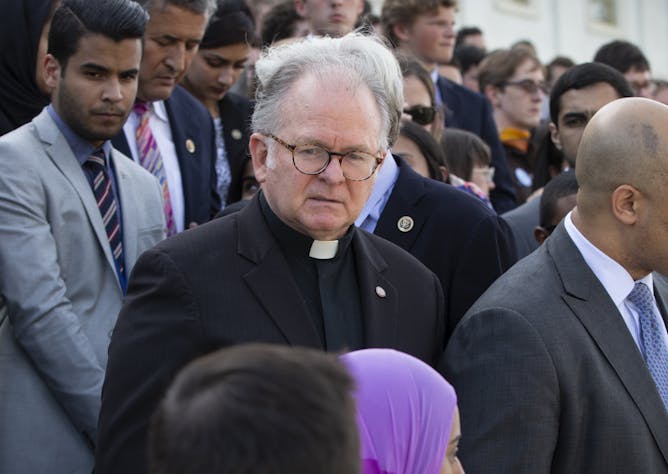|
|
|
Editor's note
|
|
If you want to be a lawyer, you go to law school. If you want to be a cop, there’s not an obvious place in higher education to pursue your dream career. To understand why that is, a police reform scholar at the University of California, Davis, Nidia Bañuelos, dug into archival material on what was once the Berkeley School of Criminology – “one of the most ambitious projects in police education ever undertaken in the U.S.” The reasons behind its demise may give us clues on how to improve police education – and policing –
today.
Nike Inc.’s locker room culture is among the latest to encounter the disinfecting sunshine of the #MeToo era. It also illustrates what many companies still don’t get about the nature of workplace harassment, argues Elizabeth Tippett, a legal scholar at the University of Oregon. Even harassment deemed “minor” and perfectly legal can be a symptom of something far more serious.
Following the controversy over the resignation of House chaplain Patrick Conroy, scholars Wendy Cadge and Laura Olson explain how Congress employs chaplains without violating the separation of church and state.
|
Danielle Douez
Associate Editor, Politics + Society
|

|
|
Top Stories
|

Police school lecture series, 1935.
Courtesy of Berkley, Ca. Police Department – Historical Unit
Nidia Bañuelos, University of California, Davis
The demise of the first academic department dedicated to policing at the University of California has left unanswered questions about the best way to educate cops.
|

The swoosh entered the #MeToo spotlight.
Reuters/Lucy Nicholson
Elizabeth C. Tippett, University of Oregon
A revolt by women at the world’s largest sport brand revealed what companies and many others still don't understand about the nature of workplace harassment.
|

Father Patrick Conroy.
AP Photo/J. Scott Applewhite
Wendy Cadge, Brandeis University; Laura R. Olson, Clemson University
Following the controversy over the resignation of House chaplain Patrick Conroy, in this speed read, scholars explain when the tradition of legislative prayer was started and how it has sustained.
|
Politics + Society
|
-
Lee Banville, The University of Montana
Democratic Senator Jon Tester of Montana has a moderate image in a state that doesn't often elect Democrats. But as he faces reelection, his move to torpedo Trump's VA nominee may threaten that image.
-
Catesby Holmes, The Conversation
Some 200 Central Americans who fled violence at home want to apply for asylum in the US. Trump says they're 'not welcome.' Here, key info on the 'caravan' standoff at the US-Mexico border.
-
Miguel Angel Latouche, Universidad Central de Venezuela
Venezuela – once known for its friendly people, oil wealth and beauty queens – ranks 102nd of 156 countries surveyed in this year's World Happiness Report, which measures well-being worldwide.
|
|
Health + Medicine
|
-
Alva O. Ferdinand, Texas A&M University
Motor vehicle crashes are a public health crisis in the US. Distracted driving laws can save lives – but only some states have them.
-
Lori A. Roscoe, University of South Florida
Few people like to talk about death, but research is suggesting that people should talk with loved ones about their wishes for their final days. You may be surprised which family member is most supportive.
|
|
|
|
From our International Editions
|
-
Mark Zeitoun, University of East Anglia; Ghassan Abu Sitta, American University of Beirut
Undrinkable drinking water is just one example of how blockades and war have permeated an entire ecosystem.
-
Merethe Skårås, Oslo Metropolitan University
For the thousands of children who have left armed groups, education is crucial to their reintegration.
-
Julia Creet, York University, Canada
A public genealogy data base was used to track down the so-called "Golden State Killer," raising concerns about the privacy of using public sites to fill out our family trees.
|
|
|
|
| |
| |
|
|
|
|
|
|
|